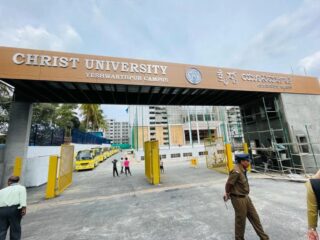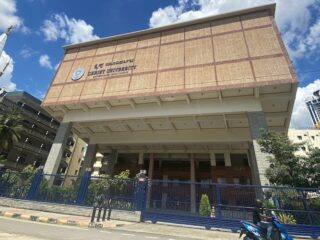Table of Contents

Choosing the right career path after 12th can feel overwhelming, especially with so many options available today. Whether you’re passionate about science, commerce, or the arts, the decisions you make now will set the foundation for your future. But don’t worry—this guide is here to help you navigate through your options and make an informed choice.
In this blog, we’ll explore the best career options after 12th for each stream, from traditional fields to emerging careers that are gaining popularity. Whether you’re aiming for a high-paying job, a creative career, or something that aligns with your passion, there’s something for everyone. Let’s dive in and discover the opportunities that await you after 12th grade!
Understanding Your Stream: A Quick Overview
After completing your 12th grade, the stream you’ve chosen—whether it’s Science, Commerce, or Humanities/Arts—will significantly influence your career path. Let’s break down what each stream offers to help you better understand where your interests might lead you.
| Stream | Subjects | Career Paths |
|---|---|---|
| Science | PCM (Physics, Chemistry, Mathematics) | Engineering, Architecture, Data Science, IT, Artificial Intelligence |
| PCB (Physics, Chemistry, Biology) | Medicine (MBBS, BDS), Biotechnology, Environmental Science, Paramedical Fields | |
| PCMB (Physics, Chemistry, Mathematics, Biology) | Both Medicine and Engineering, Biotechnology, Environmental Science | |
| PCM with Computer Science | Software Engineering, IT, Cybersecurity, AI, Data Science | |
| Commerce | Commerce with Mathematics | Chartered Accountancy, Financial Analysis, Business Management, Economics |
| Commerce without Mathematics | Business Management, Marketing, Accounting, Government Exams (UPSC, SSC, Banking) | |
| Humanities/Arts | Core Humanities Subjects | Law, Journalism, Education, Social Work, Psychology, Political Science, History |
| Humanities with Optional Subjects | Public Relations, Cultural Studies, Creative Roles in Design and Media, Economics |
Check out this detailed guide on career planning for freshers to help you align your choices with your long-term goals.
This table gives a quick and clear overview of the different streams, their key subjects, and the career paths they can lead to. It’s concise and easy to understand, helping students quickly identify where their interests might align.
Top Career Options for Science Students
If you’ve opted for the Science stream, you’re looking at a range of career paths that combine innovation, technology, and research. Here’s a detailed look at some of the best career options after 12th for Science students, including types of jobs, eligibility, and potential salaries.
| Career Path | Types of Jobs | Eligibility | Average Salary |
|---|---|---|---|
| Engineering | Civil Engineer, Mechanical Engineer, Computer Engineer, Electrical Engineer, Aerospace Engineer | B.Tech/B.E. in relevant field, qualifying entrance exams like JEE Main, JEE Advanced | ₹3 – ₹10 Lakhs per annum for freshers |
| Medicine | Doctor (MBBS), Dentist (BDS), Pharmacist, Surgeon, Medical Researcher | MBBS, BDS, B.Pharm, qualifying NEET for medical courses | ₹5 – ₹12 Lakhs per annum for freshers |
| Computer Science | Software Developer, Data Scientist, AI/ML Engineer, Cybersecurity Analyst, IT Consultant | B.Tech/B.E. in Computer Science, Information Technology, specializations in AI, Data Science, etc. | ₹4 – ₹12 Lakhs per annum for freshers |
| Biotechnology | Biotechnologist, Genetic Engineer, Research Scientist, Biomedical Engineer | B.Sc. in Biotechnology, Genetic Engineering, or related fields | ₹3 – ₹8 Lakhs per annum for freshers |
| Environmental Science | Environmental Consultant, Sustainability Specialist, Wildlife Biologist, Environmental Engineer | B.Sc. in Environmental Science, B.Tech in Environmental Engineering | ₹3 – ₹7 Lakhs per annum for freshers |
| Architecture | Architect, Urban Planner, Interior Designer, Landscape Architect | B.Arch, qualifying NATA (National Aptitude Test in Architecture) | ₹4 – ₹10 Lakhs per annum for freshers |
| Pharmacy | Pharmacist, Clinical Researcher, Drug Safety Associate, Medical Sales Representative | B.Pharm, D.Pharm, with registration from Pharmacy Council of India | ₹3 – ₹7 Lakhs per annum for freshers |
Top Career Options for Commerce Students
The Commerce stream offers a wide range of career opportunities that blend finance, business, and economics. Whether you’re interested in numbers, management, or creative business roles, here’s a detailed look at the best career options after 12th for Commerce students, including job types, eligibility, and potential salaries.
| Career Path | Types of Jobs | Eligibility | Average Salary |
|---|---|---|---|
| Chartered Accountancy (CA) | Auditor, Tax Consultant, Financial Advisor, Forensic Accountant | Must clear CA Foundation, Intermediate, and Final exams by ICAI | ₹6 – ₹20 Lakhs per annum for qualified CAs |
| Company Secretary (CS) | Company Secretary, Compliance Officer, Corporate Governance Advisor | Must clear CS Foundation, Executive, and Professional exams by ICSI | ₹4 – ₹12 Lakhs per annum for freshers |
| Cost and Management Accountancy (CMA) | Cost Accountant, Management Accountant, Financial Controller | Must clear CMA Foundation, Intermediate, and Final exams by ICMAI | ₹5 – ₹15 Lakhs per annum for freshers |
| Business Management (BBA/MBA) | Business Analyst, Marketing Manager, HR Manager, Operations Manager | BBA degree; for advanced roles, an MBA is often required | ₹3 – ₹12 Lakhs per annum for freshers, higher with MBA |
| Finance and Investment | Investment Banker, Financial Analyst, Portfolio Manager, Risk Manager | B.Com or BBA in Finance, CFA for advanced roles | ₹4 – ₹15 Lakhs per annum for freshers |
| Digital Marketing | Digital Marketing Manager, SEO Specialist, Content Strategist, Social Media Manager | BBA in Marketing or specialized certification in Digital Marketing | ₹3 – ₹10 Lakhs per annum for freshers |
| Entrepreneurship | Start-up Founder, Business Consultant, Product Manager | BBA, MBA, or relevant experience in business | Earnings can vary widely, depending on business success |
| Economics | Economist, Policy Analyst, Researcher, Economic Consultant | B.A./B.Sc. in Economics, M.A. for advanced roles | ₹4 – ₹10 Lakhs per annum for freshers |
Related Blog – check out our guide on writing a resume for freshers
Top Career Options for Humanities/Arts Students
The Humanities/Arts stream offers a broad spectrum of career opportunities that cater to creative, analytical, and socially-conscious individuals. Whether you’re passionate about culture, communication, or helping others, here’s a detailed look at the best career options after 12th for Humanities/Arts students, including job types, eligibility, and potential salaries.
| Career Path | Types of Jobs | Eligibility | Average Salary |
|---|---|---|---|
| Law | Corporate Lawyer, Criminal Lawyer, Legal Advisor, Judge, Legal Researcher | LLB (Bachelor of Laws) after 12th, qualifying CLAT or other law entrance exams | ₹5 – ₹12 Lakhs per annum for freshers |
| Journalism and Mass Communication | Journalist, News Reporter, Editor, TV Producer, Content Creator | Bachelor’s degree in Journalism, Mass Communication, or related fields | ₹3 – ₹8 Lakhs per annum for freshers |
| Psychology | Clinical Psychologist, Counseling Psychologist, School Psychologist, Organizational Psychologist | B.A. or B.Sc. in Psychology, followed by M.A. or M.Sc. in Psychology | ₹3 – ₹7 Lakhs per annum for freshers |
| Design and Creative Arts | Graphic Designer, Fashion Designer, Interior Designer, Visual Artist | B.A. or B.Des. in Design, Fine Arts, or related fields; relevant certifications | ₹3 – ₹10 Lakhs per annum for freshers |
| Social Work and Development | Social Worker, NGO Worker, Community Service Manager, Public Policy Analyst | B.A. in Social Work, Sociology, or related fields; M.A. in Social Work for advanced roles | ₹2.5 – ₹6 Lakhs per annum for freshers |
| Teaching and Education | School Teacher, College Lecturer, Educational Consultant, Curriculum Developer | B.A. in relevant subject followed by B.Ed.; M.A. and NET for college teaching roles | ₹3 – ₹6 Lakhs per annum for freshers |
| Civil Services | IAS Officer, IPS Officer, IFS Officer, Public Administration Roles | Graduation in any stream; clearing the UPSC Civil Services Examination | ₹10 – ₹15 Lakhs per annum for IAS/IPS freshers |
Make sure you’re ready for the next steps by understanding how to read job descriptions effectively. It’s an essential skill as you start applying for internships and jobs.
How to Choose the Right Career Path after 12th?
Choosing the right career path after 12th can be a daunting task, but with careful consideration and planning, you can make an informed decision that aligns with your interests, strengths, and future goals. Here are some key steps to help you choose the right career path:
- Self-Assessment:
- Identify Your Interests: Reflect on what subjects or activities you enjoy the most. Are you more inclined towards science and technology, or do you have a passion for arts and humanities? Understanding your interests is the first step in narrowing down your career options.
- Evaluate Your Strengths: Assess your academic strengths and skills. For instance, if you excel in mathematics, careers in engineering or finance might be suitable. If you’re good at communication, consider careers in journalism, marketing, or law.
- Consider Your Values: Think about what matters most to you in a career, whether it’s job stability, creativity, helping others, or earning potential. Aligning your career choice with your values can lead to long-term job satisfaction.
- Research Career Options:
- Explore Different Fields: Once you have a list of potential careers, research each field thoroughly. Look into the day-to-day responsibilities, required qualifications, job prospects, and growth opportunities.
- Consider Emerging Fields: The job market is constantly evolving, with new-age careers in fields like data science, AI, digital marketing, and sustainability gaining prominence. Be open to exploring these options if they align with your interests and skills.
- Talk to Professionals: Reach out to professionals already working in the fields you’re considering. They can provide valuable insights into the industry, the challenges they face, and the opportunities available.
- Seek Guidance and Counseling:
- Consult a Career Counselor: A career counselor can help you identify suitable career options based on your interests, strengths, and academic background. They can also provide information on the best colleges, courses, and entrance exams.
- Discuss with Family and Mentors: Talk to your family, teachers, or mentors about your career aspirations. While it’s important to make your own decision, their experience and guidance can provide a different perspective.
- Consider Practical Factors:
- Job Market and Demand: Research the current job market and identify careers that are in demand. Consider the long-term prospects of the career you choose, as some fields may offer more stability and growth than others.
- Financial Considerations: Think about the cost of education and the potential return on investment. While passion is important, it’s also essential to choose a career that can provide financial security.
- Stay Open to Change:
- Be Flexible: Remember that your first career choice doesn’t have to be your final one. The world of work is dynamic, and it’s okay to change paths if you discover new interests or opportunities.
- Lifelong Learning: Embrace the idea of lifelong learning. The skills and knowledge you acquire now will be the foundation of your career, but staying updated with new trends and technologies is key to long-term success.
Practical Steps After 12th
Once you’ve decided on a career path, it’s time to take practical steps to turn your goals into reality. Here’s what you need to do:
- Choose the Right Course:
- Research Colleges and Universities: Look for institutions that offer the best programs in your chosen field. Consider factors like faculty, infrastructure, placement records, and campus culture.
- Apply for Relevant Entrance Exams: Many professional courses require you to clear entrance exams (like JEE, NEET, CLAT, etc.). Start preparing early and keep track of exam dates and application deadlines.
- Prepare for College Life:
- Focus on Skill Development: Apart from academics, work on developing soft skills like communication, teamwork, and problem-solving. These skills are crucial for success in any career.
- Consider Internships and Part-Time Work: Gaining practical experience through internships or part-time jobs can give you an edge in the competitive job market. It also helps you apply your knowledge in real-world scenarios.
Don’t forget to polish your interview skills with our interview tips for freshers. A strong interview can set you apart in competitive fields
- Plan Your Finances:
- Explore Scholarships and Financial Aid: Many colleges offer scholarships based on merit, financial need, or specific talents. Research and apply for scholarships to reduce the financial burden of higher education.
- Budgeting and Financial Planning: If you’re moving to a new city for college, plan your finances carefully. Consider accommodation, food, travel, and other expenses. Platforms like Zolostays offer affordable and convenient coliving options, making it easier for students to manage their budget while enjoying a comfortable living environment.
- Stay Focused and Motivated:
- Set Clear Goals: Break down your long-term career goals into smaller, achievable milestones. This will keep you motivated and help you stay on track.
- Build a Support System: Surround yourself with positive influences like friends, mentors, and family, who support your goals and help you stay focused.
Conclusion
Choosing a career after 12th is one of the most important decisions you’ll make, but it doesn’t have to be overwhelming. By assessing your interests, researching your options, and taking practical steps towards your goals, you can pave the way for a successful and fulfilling career. Remember, the journey doesn’t end with your first job, it’s just the beginning of a lifelong process of learning and growth.
At Zolostays, we understand the challenges students face as they transition from school to college and then to their careers. That’s why we provide more than just accommodation; we offer a supportive community where you can focus on your studies, build lasting friendships, and grow both personally and professionally. Wherever your career path takes you, we’re here to help you make the journey a little easier.
FAQs: Career Options After 12th
After 12th Science, you can pursue careers in engineering, medicine, biotechnology, environmental science, computer science, and pharmacy. Each offers various specializations and career paths.
Without Maths, you can pursue careers in business management, marketing, accounting, company secretary, law, digital marketing, and other creative business roles.
Humanities students can explore careers in law, journalism, psychology, design, social work, education, civil services, and public relations, among others.
Assess your interests, strengths, and values. Research potential careers, seek guidance from professionals or career counselors, and consider practical factors like job demand and financial stability.
Emerging fields include data science, artificial intelligence, digital marketing, UX/UI design, sustainable development, financial engineering, and healthcare management.
Not all careers require entrance exams. However, fields like engineering, medicine, law, and architecture often require specific entrance exams like JEE, NEET, CLAT, and NATA.
Consider the college’s reputation, faculty, infrastructure, placement records, campus culture, and the specific programs offered in your field of interest.
Yes, it’s possible to switch careers, but it may require additional education or certifications. For example, you can transition from commerce to a career in law or from science to business management.
High-paying careers include engineering, medicine, chartered accountancy, data science, investment banking, and corporate law, among others.
Explore scholarships, financial aid, and education loans. Additionally, some colleges offer merit-based scholarships and there are also options for part-time work or internships to support your studies.










